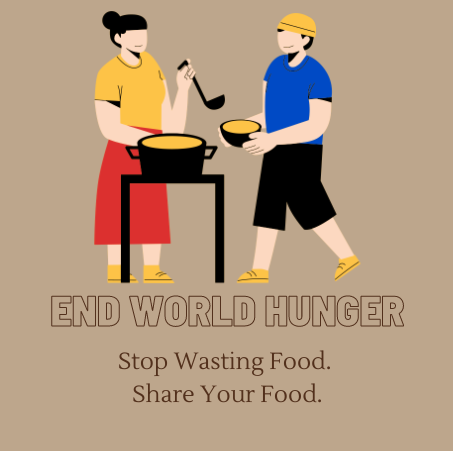The Global Food Crisis; Help End World Hunger

An End World Hunger advertisement inspires people to help in the fight against hunger.
May 4, 2023
The global food crisis began due to a surge in food prices from 2005 to 2008. This sudden price increase threatened poorer people, who already struggle to pay for food. The authors of Reflection on the Global Food Crisis conclude that the price increase was not primarily fostered by a rise in demand for meat products and rising economies like China or by the decline in agricultural yields or food stock. They concluded that the price increase had to do with a combination of rising energy prices, growing demand for biofuels, the U.S. dollar depreciation, and various trade shocks related to export restrictions, panic purchases, and unfavorable weather.
The recent war between Ukraine and Russia has sent food prices skyrocketing globally. Ukraine supplies most of the world with sunflower oil, barley, maize, and fertilizers. Ukraine and Russia supply a third of the world’s wheat. Due to the ongoing conflict, fields are unprepared, crops go unplanted, and fertilizers are unavailable. Many different things affect global food prices.
Today, as many as 828 million people are unsure where their next meal is coming from or when they will eat well next. Young girls, boys, women, and men are all affected differently by world hunger. Depending on the laws in different countries, women are less important than men. When food is scarce, girls eat last and eat less than others. As families suffer financial strain, women and girls are more likely to be pulled from school and subjected to early or forced marriage, gender-based violence, and unwanted pregnancy. In Burkina Faso, Mali, and South Sudan, adolescent girls were subject to a survey where they reported they are more likely to be married at a young age if their families are struggling financially.
There are many ways to help with the fight against hunger. Spreading awareness of the issue helps get the fight against hunger more attention. Some ways in which people can help in the fight against hunger are funding humanitarian efforts to prevent famine, investing in smallholder farmers, investing in climate-smart agriculture, promoting a planetary health diet, eliminating food waste, ensuring everyone can afford nutritious diets, and guaranteeing universal school meals.
